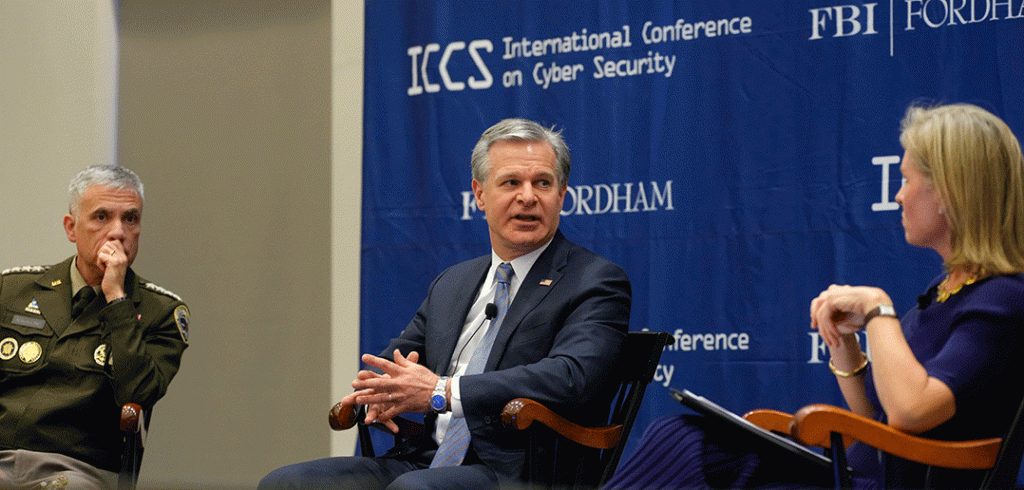“Americans can and should have confidence in our election system,” Wray said. “And none of the election interference efforts that we’ve seen put at jeopardy the integrity of the vote count itself in any material ways. And so in that sense, people can have confidence.”
But that doesn’t mean there aren’t threats to the election process, he said, particularly highlighting foreign governments’ desire to meddle.
“The other part, though, is the chaos, and the ability to generate chaos is very much part of the playbook that some of the foreign adversaries engage in,” Wray said. “And there is the potential. If we’re not all collectively on board, that chaos can ensue to varying levels.”
Wray and Nakasone spoke in a fireside chat moderated by Mary Louise Kelly, host of NPR’s All Things Considered, at the 10th International Conference on Cyber Security, held at Fordham on Jan. 9. Kelly asked how 2024 compares to the 2020 election year.
“Every election as you know is critical infrastructure,” Nakasone said. “We have to be able to deliver a safe and secure outcome. And so when I look at it, I look in terms of both the threat and the technology—but yes, it’s an important year, it’s a presidential election year, and we have adversaries that want to take action.”
Protecting America’s AI Innovation
Nakasone said that as they look at foreign adversaries and how they are using AI, he noticed that they “are all using U.S. AI models, which tells me that the best AI models are made by U.S companies.”
“That tells me that we need to protect that competitive advantage of our nation, of our national economy going forward,” he said.
But that’s not an easy task, Wray added, noting China’s advantage in particular.
“China has a bigger hacking program than that of every other major nation combined and has stolen more of Americans’ personal and corporate data than every nation, big or small, combined,” he said. “If I took the FBI’s cyber personnel and I said, ‘Forget ransomware, forget Russia, forget Iran—we’ll do nothing but China,’ we would be outnumbered 50 to 1, and that’s probably a conservative estimate.”
Nakasone said that’s why it’s important for the agencies to maintain the United States’ “qualitative advantage.”
“How do we ensure that our workforce is continuing to be incredibly productive?” he said.
Combatting Foreign Adversaries
In addition to China, Wray and Nakasone highlighted Russia and Iran as threats, even as Russia is occupied with the war in Ukraine.
“If anything, you could make the argument that their focus on Ukraine has increased their desire to focus on trying to shape what we look like, and how we think about issues because U.S. policy on Ukraine is something that obviously matters deeply to their utterly unprovoked and outrageous invasion of Ukraine,” Wray said.
In order to combat their efforts to interfere in elections, Nakasone highlighted partnerships between agencies like the NSA and FBI, and the quality of work that U.S. agencies do.
“It will never be having the most people—it’s having the best people and the best partnership being able to develop and deliver outcomes that can address adversaries,” he said.
Calling Out Misinformation and Disruptions
Kelly highlighted a recent poll from The Washington Post that found that one-third of Americans believe that President Joe Biden’s win in 2020 was illegitimate and that a quarter of Americans believe that the FBI instigated the January 6 insurrection.
“I’m not trying to drag either of you into politics,” she said. “But what kind of charge does that pose for your agencies as you try to navigate this year?”
Wray said it’s important for the NSA and FBI to call out misinformation right away. He highlighted how in October 2020, the FBI called out Iran’s interference efforts ahead of the November elections in an effort to make the messaging less effective.
“We have to call it out when we see it, but we also need in general for the American people, as a whole, to become more thoughtful and discerning consumers of information,” he said.
The Use of Section 702: ‘A Vital Tool’
In December 2023, Congress gave a four-month extension to Section 702 of the Foreign Intelligence Surveillance Act (FISA), which allows intelligence agencies to conduct surveillance on non-American citizens who are outside of the United States without a warrant. The section has come under scrutiny as privacy advocates and members of both parties said it’s an overreach of government powers.
Nakasone called it “the most important authority we use day in and day out in the National Security Agency to protect Americans.”
He said that the agency uses it to address a number of different threats: “whether or not that’s fentanyl or Chinese precursors [to fentanyl]coming in United States, whether or not it’s hostages that foreigners take overseas, whether or not it’s cybersecurity, in terms of victims that we’re seeing in the United States.”
Wray said that the section was “a vital tool.”
“This country would be reckless at best and dangerous at worst to blind ourselves and not reauthorize the authority in a way that allows us to protect Americans from these foreign threats,” he said.

